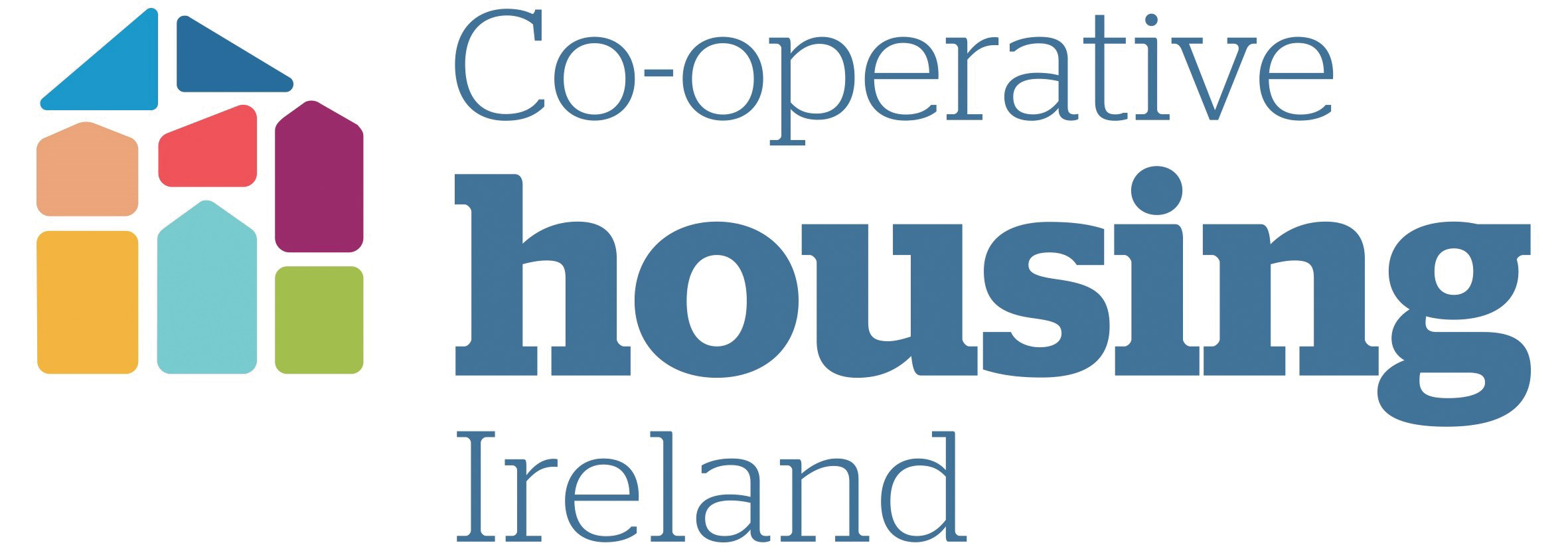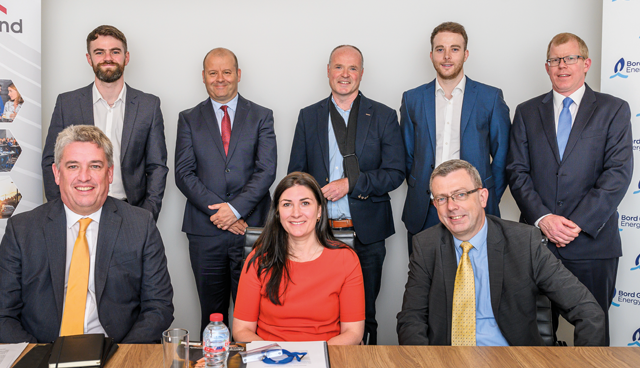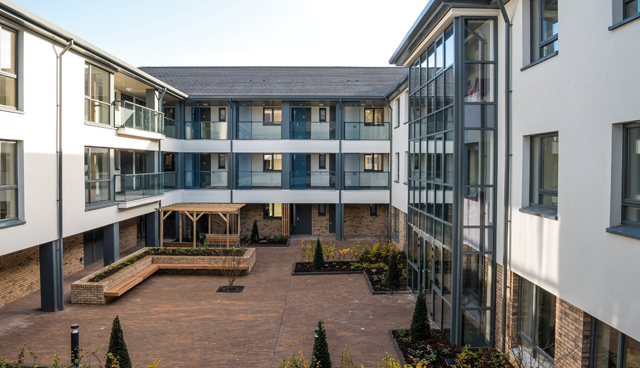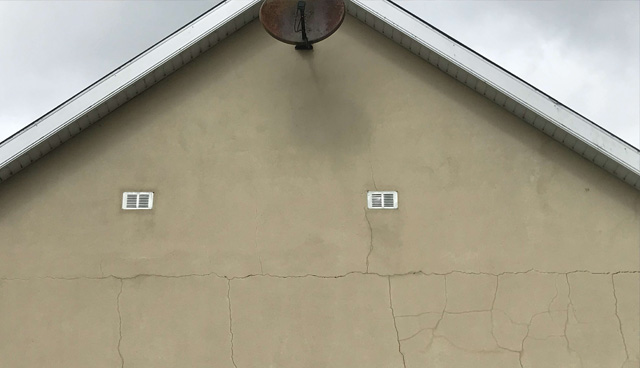
€2.7 billion mica redress scheme approved
4th July 2022
The Housing Supply Strategy for Northern Ireland
4th July 2022CHI’s priority is to ensure the warmth and wellbeing of members
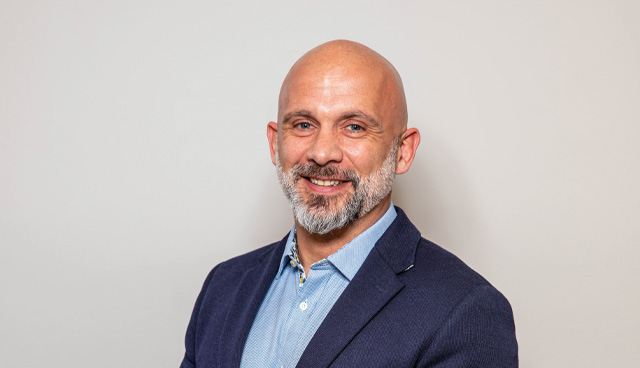
CHI’s Head of Asset Management and Property Services, David McCourt.
Head of Asset Management and Property Services, David McCourt, discusses how Co-operative Housing Ireland (CHI) has committed to a series of deep retrofit energy upgrades on the homes of its members to improve quality of life, extend the lifespan of housing and contribute to national plans to reduce long-term dependency on fossil fuels.
In recent years, it has become apparent that there is a need to drastically decrease our use of fossil fuels. The Government’s Climate Action Plan 2021 outlines actionable steps to reduce greenhouse gas emissions by 51 per cent by 2030 with the aim of eventually reaching net-zero carbon emissions by 2050. Retrofitting homes and buildings is a key element of the plan and reaching these targets.
CHI retrofitted 140 homes in 2021 and will deliver an additional 216 retrofits over the next couple of years in its Improving Warmth and Wellbeing programme.
“As an Approved Housing Body, our primary responsibility is to our members, so the biggest benefit we get from retrofitting our houses is ensuring their warmth and wellbeing, which also benefits them in terms of their reducing their cost of living,” McCourt says.
He continues, “The second benefit from an asset management perspective is that we are futureproofing and protecting stock. We are protecting the asset from damp, water ingress, and we are improving the structure.
“Since the beginning of 2022, 52 homes have been upgraded in South Earl Street and Seán MacDermott Street, both in Dublin city centre. It is planned that CHI commences phase two of the project in the second half of the year, which aims to upgrade an additional 50 plus homes by December.”
Upgrading the energy efficiency of CHI homes by insulating walls and attics, installing new windows and doors, and fitting new air-to-water heat pumps alleviates some of the pressure on those at risk of energy poverty by providing reliable, cost-effective, and sustainable ways of keeping their home warm, damp free, and with a constant supply of hot water.
In the current environmental, economic, and social climate, retrofitting is not without its challenges, despite increased financial support from bodies such as SEAI and SSE Airtricity, supply chain issues, availability, and prices of raw materials, and demands for labour in the retrofitting sector all pose significant difficulties.
McCourt explains further: “To date, most of the emphasis in the construction sector has been in the delivery of new, high efficiency and NZEB (nearly zero energy building) homes and not on retrofit. The capacity of the sector to scale up to meet the demand and these targets will be critical. The National Climate Action Plan has called for 500,000 retrofits to be completed by 2030.
“At the minute there are not many specialists in the market focusing on retrofits and this lack of capacity makes it difficult to scale up the delivery of these type of projects. The biggest challenge for all approved housing bodies and landlords over the next couple of years, is delivering retrofit targets with limited specialist capacity. When coupled with the volatile construction market, Brexit, the Russia-Ukraine war, and the availability of raw materials, this lack of specialist labour is putting pressure on the sector.”
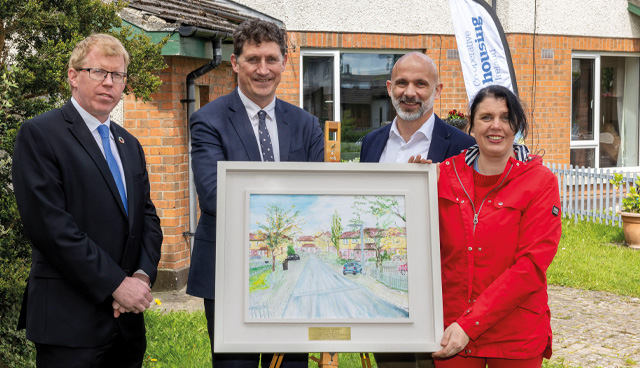
(L-R): Director National Retrofit, SEAI, Ciarán Byrne, Minister for the Environment, Climate and Communications, Eamon Ryan TD, CHI’s Head of Asset Management and Property Services, David McCourt, and CHI Member and artist Jennifer Loughran. Minister Ryan was presented with a painting by Ms Loughran to celebrate the end of phase one of Co-operative Housing Ireland’s ‘Improving Warmth and Wellbeing’ programme. Pictured Wednesday 11th May 2022, Conor Healy, Picture It.
CHI manages close to 4,000 homes across the country, so it is imperative that homes most at need of energy upgrades are identified. McCourt discloses the process by which homes are deemed to meet eligible criteria for retrofitting: “The Asset Management Team identify properties to retrofit by looking at the worst performing buildings in terms of energy ratings. To do this we look at the property’s current Building Energy Rating (BER). A BER certificate rates the property’s energy performance on a scale between A and G.
“A-rated homes are the most energy efficient while G-rated are the least energy efficient. The Improving Warmth and Wellbeing Project aims to bring properties up to a minimum of BER B2. In South Earl Street several properties had a BER rating of E, which is quite low, and we were looking to bring them up to a minimum B2 and in nearly every instance exceeded this target rating. This results in a massive increase in energy efficiency, reduction in the amount of heat loss that those buildings experience and increased savings in terms of expenditure on heating for our members.”
One-stop shops are crucial players in helping approved housing bodies to meet retrofitting goals in a timely and professional manner. McCourt continues: “To deliver these deep energy retrofit upgrades, CHI engaged a project management team, Kingdom Installations, who have been our partner on previous Deep Retrofit Projects. Kingdom Installations are mandated by SEAI as a one-stop shop for the delivery of retrofit projects.
“The first step for Kingdom is to verify the current BER rating of the property. Using software, they then model the improvement in energy rating based on the type of measure that they propose to deliver, like pumping the cavity with insulation, installing a heat pump, installing high output radiators, and insulating the ceiling. The target is always to get the property up to a BER rating of B2. Once the modelling is complete an estimate of the cost of the upgrade can be generated.”
With the current grants available from the Sustainable Energy Authority Ireland (SEAI) under the National Home Retrofit Scheme, CHI can generally expect to receive up to 50 per cent funding for a project in addition to around 10 per cent from SSE Airtricity. The remainder is paid by the organisation. The work undertaken on these homes greatly reduces the cost of maintenance on the households for the short and long-term.
For more information:
T: 01 661 2877
E: admin@cooperativehousing.ie
W: www.cooperativehousing.ie
Twitter: @coophousingie

